Media & Press
To request interviews or connect with us please email press@tanseeqinvestment.com or call +971 (0)4 240 2277.
Myplant & Garden Middle East Announces Tanseeq Investment Group as Its First Strategic Partner
Learn moreExcitement is building for the highly anticipated debut of Myplant & Garden Middle East, scheduled to take place at Dubai Expo City from November 15–17, 2025.
Mature Accent Trees (Plumeria) Available Now in the GCC
Learn moreThis article is part two of the ‘Matured Ornamental Trees’ series. The first article was published in Landscape Magazine issue: May 2…
Mature Ornamental Trees Available Now in the GCC
Learn moreThe GCC has flourished extraordinarily in recent decades
with cosmopolitan cities, glittering skylines and lush green….
Living Green-Walls and Biophilic Interiors in the New Muscat International Airport.
Learn moreThe world’s major cities are increasingly investing in attractive landscaping and the hub of transit, technology and …
Planting Roots
Learn moreDubai Parks and Resorts (DPR) is the Middle East’s largest integrated entertainment and leisure destination, located on Sheikh Zayed Ro…
Transforming Vision into Reality
Learn moreProscape was established in 2000; in Dubai, and is a premier landscape contracting company in the GCC. The company has successfully com…
Proscape Completed DPR Projects In Time
Learn morePublic Realm Landscaping and Advanced Procurement Of Plants
Proscape has successfully executed many prestigious projec…
Matured Accent Trees (Olive) Available Now in the GCC
Learn moreThis article is part three of the ‘Matured Ornamental Trees’ series.
The first article was published in Landscape Magazine issue: May 2019…
Proscape LLC Launches Infrastructure Division
Learn moreEstablished in 2000, Proscape LLC, the flagship company of Tanseeq Investments LLC, has become one of the leading landscaping contracto…
Mature Accent Trees (Plumeria) Available Now in the GCC
This article is part two of the ‘Matured Ornamental Trees’ series. The first article was published in Landscape Magazine issue: May 2019 titled ‘Matured Ornamental Trees Available Now in the GCC’.
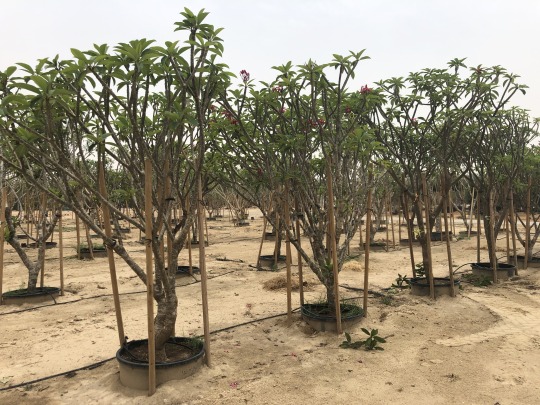
Acacia LLC is currently the leading supplier of matured ornamental trees for landscaping projects in the GCC, and one of the subsidiary companies under Tanseeq Investment Group of Companies. Purchasing mature trees has major time and cost saving benefits as it annuls the process of having to plant seedlings and wait several years for the trees to mature. Additionally, this can save valuable resources especially if the seedlings do not manage to grow to expectations.
The previous article outlined the cultivation and exportation process of mature ornamental trees undertaken by Cottonwood Nurseries, an agro-tech company based in South India that was started by Mr Naser Ahmed.
The ornamental trees produced by Cottonwood are grown to comply with BS (British Standard) 1:1992 3936 and are known as ‘avenue trees’, which are typically used to landscape road sides and sidewalks. Avenue trees are tall trees with a wide canopy spread and optimum clear trunk (distance from the base of the tree to the first branch) to provide shade for pedestrians and appporpriate space for them to walk under the canopy.
Accent trees, on the other hand, serve to enhance the beauty of gardens and green-scapes. They are typically medium to small trees and are characterized by multiple branches starting from the base of the trunk.
The most common accent trees in the UAE are the Plumeria tree and Olive tree, the second of which will be covered in the next article of this series.The majority of Plumeria trees are grown and imported from India and Thailand.
There are several species indigenous to India and Thailand and Acacia LLC supplies the two types of Plumeria trees that are most popular in the UAE for landscaping.
These are Plumeria Obtusa, which bears whiteflowers, and Plumeria Rubra, which bears red flowers.
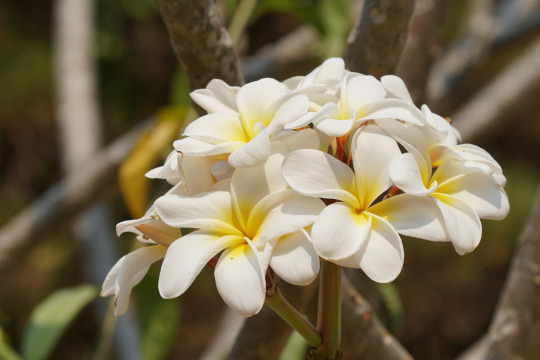
Plumeria obtusa flowers
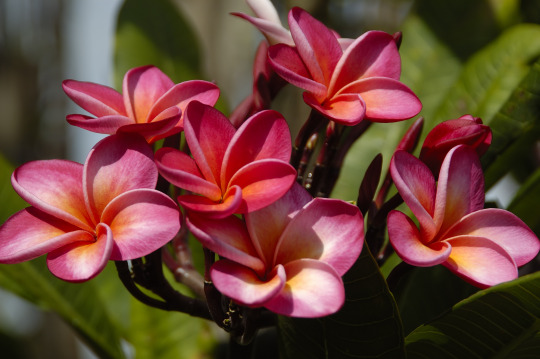
Plumeria rubra flowers
There are currently no standards available for accent trees to inform their suitability for landscaping projects. The BS 3936 1 :1992 criterion is a very valuable standard for avenue trees but cannot be similarly applied to accent trees.
Hence, under the guidance of Mr Naser Ahmed, Acacia LLChas devised its own set of specifications for both Plumeria trees and Olive trees.
For Plumeria trees, the parameters are:
1. Stem girth
2. Number of branches (minimum)
3. Overall height
4. Container size
Plumeria flowers are well known for their fragrance and blossom in early summer. Plumeria trees, themselves, are well suited to the local climate. They are resilient trees which the harsh summers of the gulf and require minimal maintenance, all of which make the Plumeria tree an ideal ornamental
tree for the GCC.
Mature Ornamental Trees Available Now in the GCC
The GCC has flourished extraordinarily in recent decades with cosmopolitan cities, glittering skylines and lush green landscapes. Phenomenal progress in landscaping and irrigation technology has made much of this possible.
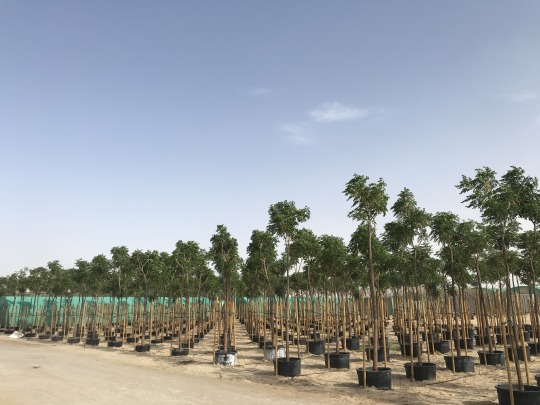
Phenomenal progress in landscaping and irrigation technology has made much of this possible. The past few years in particular have seen the emergence of an innovative trend in landscaping that has the potential to be an industry game-changer. Instead of planting twigs and waiting several years for them to grow, matured ornamental trees are now available on the market. This movement is spearheaded by Acacia LLC, a Dubai-based supplier of matured trees to landscaping projects which is a member of the Tanseeq Investment Group of Companies.
Tanseeq Investment LLC heads a group of eighteen successful companies founded and headed by Mr. Ahmad Anoohi (Chairman) and Mr. Naser Ahmed (Group CEO). Each company specializes in a particular discipline of landscaping and, together, offer a one stop solution for all landscaping requirements.
Acacia LLC imports ornamental trees from countries around the world, including Thailand, Malaysia, China, India, Spain, Italy, USA and Holland. One enterprise that specializes in ornamental trees is Cottonwood Nurseries, an agro-tech company established in 2009 by Mr. Naser Ahmed to produce ornamental trees complying with BS (British Standard) 3936 1: 1992.
Cottonwood has over 90 acres of cultivated land in South India comprising of self-sustaining and eco-friendly nurseries which employ solar power and gravity fed drip irrigation systems. The water for irrigation is sourced from under-ground aquifers.
Cottonwood exported its first shipment of ornamental trees, 1000 numbers of girth 20-25 cm, to the UAE in 2015. Since then, the company has grown exponentially in experience, innovation and nursery space and is set to deliver 20,000 trees to Acacia LLC this year alone and a further 30,000 trees in 2020. The establishment of Cottonwood has helped streamline the supply process for Acacia LLC and, most importantly, control the quality of the mature trees from source to delivery.
Cultivating the trees is a time-intensive task which requires patience and careful nurturing. The twigs are grown from seeds in individual pots to a height of one meter before being planted in the ground at optimal spacing. The twigs are then grown to maturity adopting special pruning techniques to comply with BS 3936 1:1992.
The parameters for these standards are:
– Clear trunk
– Girth (or circumference) of trunk
– Overall height
In addition to the above, Cottonwood also takes the following parameters into consideration:
– Canopy spread
– Container size
Currently, Cottonwood is able to produce trees reaching a girth of 35 40 cm, which typically takes 6-7 years from planting of the twig. BS 3936 1:1992 covers mature trees having a maximum girth of 14-16 cm only, whereas Cottonwood exceeds the British Standards in girth and all other parameters
The most challenging phase of this journey is the preparation, stabilization and transportation of the ornamental trees from India to Dubai in accordance with UAE’s Ministry of Environment regulations, which calls for a planting medium free of natural soil. This is a four stage process and can take 26-40 weeks, depending on the type of tree.
The first stage involves carefully pruning the roots and then uprooting the mature trees from the ground. This process takes 6-8 weeks, including the stabilization period. In the second stage the roots of the trees are thoroughly washed of residue soil and then transplanted into bags containing cocopeat, a stable and sterile planting medium. This is followed by a stabilization period of 8 weeks.
The third stage sees the transportation of the trees from the nurseries to the port of shipping in India. The trees are carried in reefer containers fitted with temperature monitors to help maintain an optimum environment until they reach the port of destination in Dubai, UAE. The shipment is then transported to Acacia LLC’s nurseries in Dubai. Finally, the trees are transplanted in pots and undergo an establishment period of 12-24 weeks to develop an optimum canopy spread, before they are ready to be sold. Cottonwood and Acacia LLC have acquired valuable experience and expertise to minimize mortalities to 5%, with 95% of trees reaching Acacia LLC in excellent condition.
Living Green-Walls and Biophilic Interiors in the New Muscat International Airport.
The world’s major cities are increasingly investing in attractive landscaping and the hub of transit, technology and transportation are ideal locations for green infrastructure to become an investment in public health and well-being.
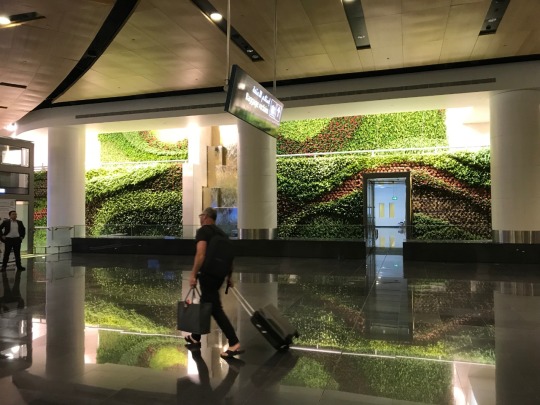
In under five decades, The Sultanate of Oman has transformed into a modern state and is becoming an ever more attractive destination for business and leisure travel. In order to keep pace with subsequent rapid growth, the Gulf State has invested in the expansion of its airport in Muscat; offering an ultra-modern infrastructure that spans a total area of 335,000m², making the airport an impressive gateway to the world. It is characterized by contemporary interiors with subtle Omani overtones which successfully blends traditional and futuristic themes. The new Muscat International Airport opened to operations on 20 March 2018.
After many years of planning and construction, the new passenger terminal of Muscat Airport is exemplary in many respects of pioneering architecture. The biophilic interiors of the new airport have unique features such as living green-walls, interior landscape & a recreated dry wadi.
LIVING GREEN-WALLS
Living green-walls are the best solution and latest growing trend in implementing an environmentally friendly solution to vertical spaces. It offers a visual feast of lush greenery and an oasis ambience to the overall urban architecture. Changi Airport, Singapore, Edmonton International Airport, Canada and Christchurch Airport, New Zealand are among the international airports that have installed living green-walls at their terminals.
A unique pair of identical living walls are located inside the Passenger Terminal Building (PTB) in both the arrivals and departures areas of the Muscat Airport. It spans across three levels and covers an area of 400 m² in total, which is the biggest of its kind in the GCC./p>
This product is developed by Biotecture Ltd UK, a company that provides green-walls technology to transform any urban environment. The patented hydroponic, modular system brings a new level of sustainability to vertical gardens through intelligent water management and stable system dynamics. Uniflora and Proscape played a key role in its design, coordination, implementation and are responsible for ongoing maintenance.
The designs are as true to the originals as botanically possible, from the drawings to reality, thus producing a verdant masterpiece that is ever vibrant as seen below.
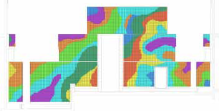
These living green-walls boast a variety of plants that are procured from Europe and are grown in compact modular panels with an inert, hydroponic medium. An integrated irrigation system is included with precise pressure compensated drip tubes installed above each row of panels with extremely accurate flow rates; the irrigation plant room houses the WRAS approved break tank, pump, valves and remote sensing controller. The overall control of the irrigation system is fully automated with remote sensing capability.
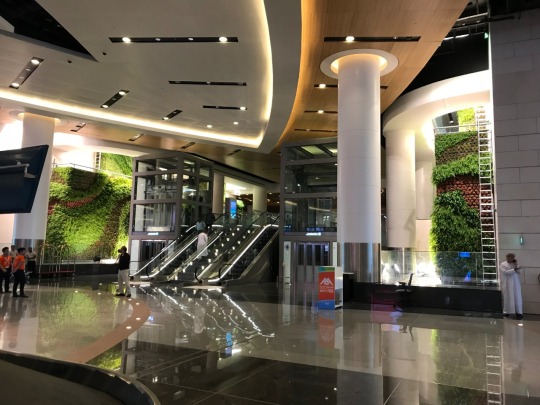
Interesting facts:
- Largest Indoor Living Wall in the GCC
- 24,000 – Indoor Plants
- 13 – Different Plant Species
- 60/m² – Planting Density
- 75kg/m² – Fully Planted System Weight
- 100% – Recycled Polypropylene Panels
- Low Water Requirement
- Lighter than Soil-Based Systems
- Slimmer than Soil-Based Systems
- Aesthetic Benefits
- Remote Sensing
INDOOR PLANTS
Interior plants are vital to any environment that aims to be healthy, supportive and sustainable.
Interiorscaping is the art and science of growing and arranging plants indoors in a thoughtful and purposeful manner. It involves the selection, placing and maintenance of plants to improve and enhance the appearance of the indoor environment. Airport aesthetics can leave a lasting impression on passengers, even if they are only in transit.
The new airport has interior plantscape at prominent locations which Proscape has implemented in areas including VVIP arrivals, VIP courtyards, general departure and arrival. Exotic indoor plants and trees were chosen to create the designs; which includes Ficus benjamina as specimen trees with other plants such as Anthuriums, Peace Lilies, Calatheas, Scheffleras, Syngoniums. A total number of 10,000 plants and trees contribute to the unique and alluring beauty of the interiorscape. All the interior garden areas are controlled and maintained by automated irrigation systems.
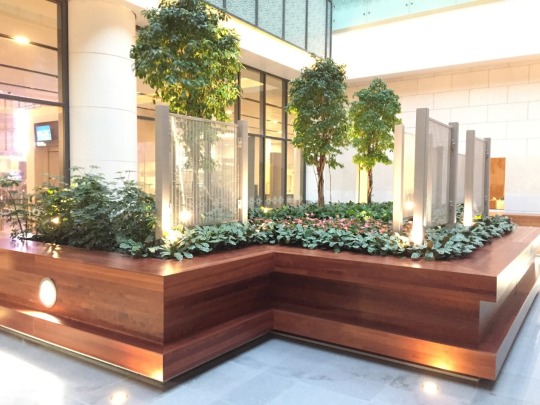
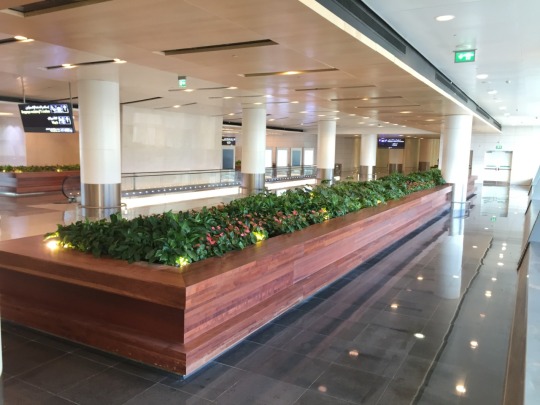
DRY WADI
The term Wadi derives its root from the Arabic language. It specifically refers to a dry riverbed that contains water during rainy seasons and is located in a valley-like area of the desert. The new Muscat Airport has a special arrangement to recreate the natural wadi in the interiors of the building.
Proscape LLC (Muscat) had put in earnest effort to make the wadi into a reality, which involved careful craftsmanship in the selection of assorted natural stones as well as the arrangement and installation of them by gluing all the stones to the existing base in such a manner to recreate the outdoor natural habitat of Oman. Approximately 2,400 artificial plants are fixed among natural stones to create the overall wadi effect. These are located at the departure & arrival areas on both sides of the escalator belts.
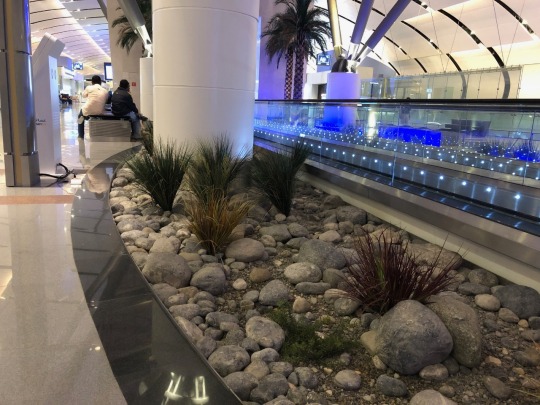
Planting Roots
Dubai Parks and Resorts (DPR) is the Middle East’s largest integrated entertainment and leisure destination, located on Sheikh Zayed Road; Dubai. DPR opened to the public in December 2016 and has attracted over 2.5 million visitors from all over the globe. It has become a world renowned leisure facility comprising of six attractions: Motiongate Dubai, Bollywood Parks Dubai, Legoland Dubai, Legoland Water Park, Riverland Dubai and Lapita Hotel Dubai. Six Flags thrill park is also in the pipeline and is expected to open to the public by 2020. The tourist attraction extends over a land area of 25 million square feet and has over 100 rides and attractions.
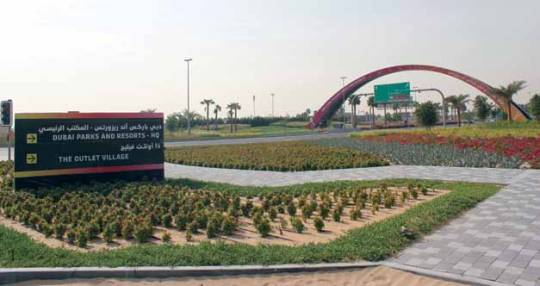
Riverland (Public Realm) landscaping constitutes all the common land areas between the theme parks and hotels, a total of approximately 55,000 square meters. It is divided into four different zones:
The French Village: 16th century town inspired by the village of Annacy; France, that features medieval architectural towers, a water wheel and cobble stone landscapes.
Boardwalk: Inspired from 1950’s America, the Boardwalk combines lots of neon with lofty structures and palm trees providing the perfect urban setting for live entertainment.
India Gate: Impressive artistic sculptures dot the landscape taking viewers on a mesmerizing journey through India. It also includes a lively plaza filled with plenty of acrobats, musicians and street food vendors.
The Peninsula: The 19th century architectural themed zone at the heart of Riverland is surrounded by a man-made river. The beautifully landscaped large outdoor piazza is a popular venue for concerts and festivals.
After careful consideration of the scope and potential challenges involved, the Riverland (Public Realm) deployment works were awarded as a design and build job to Proscape LLC. Their in house design team rose to the challenge and accommodated the changes required as per the site conditions. The scope of work for the project included soft and hard landscaping, irrigation, landscape lighting and the construction of Pergone boundary walls. The Pergone walls were specially imported from Germany, and are another feature of the project that was introduced for the first time in the UAE.
ProscapeLLC wasalsoawarded the package for the advance procurement of plants for the entire DPR development. This was a challenging and ambitious undertaking tried for the first time in the UAE and required the import of a large quantity of trees and palms from around the world. Consultants were flown to Spain, Italy and Thailand for their selection. Plants were also imported from India, Malaysia and China.
The landscape has almost 190 types of plant species including 6,195 palms; 24,730 trees; 2.62 million shrubs and ground cover, and grass sourced both locally and overseas.
The iconic grand Hero-Tree, Samanea Saman, was specially imported from Thailand and stands at a towering 10 meters with a girth of three meters. It is the largest tree to be successfully imported and planted for any landscaping project in the UAE.
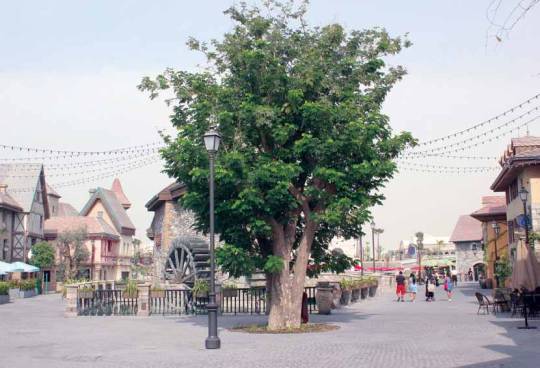
[Published in Landscape Magazine: Middle East; April 2018]
Transforming Vision into Reality
Proscape was established in 2000; in Dubai, and is a premier landscape contracting company in the GCC. The company has successfully completed major commercial, leisure and hospitality projects in the region and retains international operations in Qatar and Oman. Proscape is a member and the flagship company of Tanseeq Investment LLC.
Since inception, Proscape has participated in numerous illustrious projects for Emaar. The most well-known and iconic of these is the Burj Khalifa, the tallest tower in the world. Proscape was contracted for the complete hard and soft landscaping works, designed by SWA Group; San Francisco, CA-USA and the installation of seven water features. designed by WET; Sun Valley, CA-USA. The landscaping scope of works comprised a total area of 11 hectares, including the Armani hotel, residential and office entrance areas.
Proscape’s portfolio for Emaar’s projects include other prestigious developments such as the Dubai Mall, Street of Dreams, MBR City, Arabian Ranches-2, Reem Oasis and the Address Boulevard. The scope of work for MBR City comprised 385,000m2 of pristine landscaped areas, including a 3000m artificial dry wadi, four water features and five 10-meters-high entrance gateways. Arabian Ranches-2 comprised more than 56,000m2 of landscaped areas, including a tennis court, two children’s play areas and two swimming pools. Reem Oasis comprised more than 67,000m2 of landscaped areas, including an amphitheater, tennis and basketball courts, a children’s play area and two swimming pools.
Proscape continues to contribute to Emaar’s vision for Dubai with its involvement in current projects like the Address Fountain View Towers, Address Sky View Residences and Boulevard Point. Skyview is envisioned to have 23,500m2 landscaped areas comprising six water features and three swimming pools while the Fountain View Towers is envisioned to have landscaped areas comprising a basketball court, three water features and a children’s play area.
Proscape LLC Launches Infrastructure Division
Established in 2000, Proscape LLC, the flagship company of Tanseeq Investments LLC, has become one of the leading landscaping contractors in the region. Proscape has successfully completed major commercial and hospitality projects in the GCC, with overseas divisions in both Oman and Qatar. It has led the conception of a special chain of integrated companies aiming to provide the primary scope of services and materials for the landscaping sector in the UAE.
Proscape is now announcing the start of its new infrastructure division that specializes in the construction of community development projects, for the public and private sector. This may include: roads infrastructure with underground utility network in the Right Of Way (ROW), comprising of gravity and pressure network systems; telecom and electrical network systems, street lighting, etc. Drawing courage from years of vast experience in related fields and with the support of expert industry professionals, Proscape has commenced its new operations from 1st January 2017.
The group is affirmative and geared with its new diversification operations to contribute and cater to infrastructure requirements of Dubai, and would thank all stakeholders for the wonderful opportunity and their invaluable support.
Proscape Completed DPR Projects In Time
Public Realm Landscaping and Advanced Procurement Of Plants
Proscape has successfully executed many prestigious projects since its inception in the year 2000. The com- pany’s portfolio includes several large hospitality, leisure and commercial projects in UAE, Qatar and Oman. The list includes Burj Khalifa, JBR Walk and Dubai Canal in Dubai; Wahat al Karama and Mushrif Central Park in Abudhabi; Doha Sheraton Park and Westin Hotel in Qatar: Seeb Sea front in Muscat.
DPR is Middle East’s largest integrated entertainment and leisure destination located on Shaikh Zayed Road, Dubai. The tourist attraction extends over a land area of 25 million square feet and brings together a luxury hotel, three major theme parks and one water park: Legoland, Motiongate, Bollywood Park and Legoland Waterpark, respectively. DPR opened to the public on 18 December 2016.
Having gained credibility in the industry, Dubai Parks and Resorts (DPR) awarded Proscape the following two major projects.
Advance Procurement of Plants
For the first project, Proscape was contracted for the large-scale supply of plants to the entire DPR venture. It was a challenging and ambitious undertaking tried for the first time in the UAE and required the import of large quantity of trees and palms from around the world. Proscape flew DPR consultants to Spain, Italy and Thailand for selections of plants. More plants were also imported from India, Malaysia and China.
Proscape has procured 5,500 palms, 11,000 trees and 2.6 million shrubs, ground cover, grass etc., sourced both locally and overseas. One hundred and eighty seven types of plant species were used in the project.
Proscape also sourced a grand Hero-Tree that was specially imported from Thailand. The tree, Samanea Saman, was 10 meters in over all height with a girth of three meters. It is the largest tree to be successfully imported and planted for any landscaping project in the UAE.
Public Realm Landscaping
The public realm constitutes all the common land areas between the theme parks and hotels, a total of 50,000 square meters. It was a design and build job, where Proscape’s in-house design team contributed to the final design accommodating the changes as per the site conditions.
Proscape’s landscaping services for the project included soft and hard landscaping, irrigation, landscape lighting and the construction of Pergone boundary walls. The Pergone walls were specially imported from Germany, and are another feature of the project that was introduced for the first time in the UAE.
Future
Proscape will continue to push limits, and is looking forward to working with more clients and accepting greater challenges. The company’s core objective will always remain “Transforming Vision Into Reality”.
[Published in Business Review: Middle East; May 2017]
Matured Accent Trees (Olive) Available Now in the GCC
This article is part three of the ‘Matured Ornamental Trees’ series. The first article was published in Landscape Magazine issue: May 2019 and is titled ‘Matured Ornamental Trees Available Now in the GCC’. The second article was published in Landscape Magazine issue: June 2019 and is titled ‘Matured Accent Trees (Plumeria) Available Now in the GCC’.
Acacia LLC, a subsidiary company under the Tanseeq Investment Group of Companies, is currently the leading supplier of matured ornamental trees for landscaping projects in the GCC. Purchasing matured trees has major time and cost saving benefits as it annuls the process of having to plant seedlings and wait several years for the trees to mature. This can additionally save valuable resources, especially if the seedlings do not manage to grow to expectations.
The previous article covered Plumeria trees that are widely used as accent trees in local landscaping which serve to highlight key attractions and enhance visual experience. The second species covered in this article is the Olive tree, which is equally popular and well-loved. Acacia LLC specializes in supplying eleven different forms of Olive trees that are imported from Spain and southern Italy:
A. Olea Europaea: Bonsai)
B. Olea Europaea: Multi-Branch Linear
C. Olea Europaea: Specimen 1
D. Olea Europaea: Specimen 2
E. Olea Europaea: Cone Shape
F. Olea Europaea: Espalier
G. Olea Europaea: Half-Standard
H. Olea Europaea: Mini-Standard
I. Olea Europaea: Standard
J. Olea Europaea: Pon Pon
K. Olea Europaea: Multi-Branch Specimen
1. Pot size
2. Girth
3. Over all height
4. Clear trunk (dependent on species)
Olive trees are highly ornamental plants which are ideal for topiary – they keep their foliage year-round and have a beautifully sculpted trunk and branch structure. Olive trees become more gorgeous with age and are extensively used in hotels, corporate landscaping and streetscapes.
For example, the Olea Europaea: Specimen trees are popularly used as accent trees in roundabouts and villas. The Olea Europaea: Half Standard, Olea Europaea: Mini Standard and Olea Europaea: Multi-Branch Specimen are particularly favoured to go in planters.
Similar to most other evergreen trees, Olive trees are slow growing which makes them pair especially well with planters as they do not need to be re-potted for several years. They look stunning when planted in decorative containers and require relatively low maintenance to flourish.
They look stunning when planted in decorative containers and require relatively low maintenance to flourish. Olive trees in general are very versatile and make a majestic addition to any landscaping project.
Tanseeq Investment LLC heads a group of eighteen successful companies founded and headed by (Chairman) Mr Ahmad Anoohi and (Group CEO) Mr Naser Ahmed. Each company specializes in a select discipline of landscaping and, together, offer a one stop solution for all landscaping requirements.
[Published in Landscape Magazine: Middle East; September 2019]
